News & Event


News & Event
News & Event
Online Forum on the National Basic Plan for Human Resources in S&T(1) - Role of Universities
- Writer Chaerin Park
- Date2020-09-10
- Hit1,399
File
-
Download
 20200911092530.png
(1.36MB / Download 313회)
20200911092530.png
(1.36MB / Download 313회)
On September 10th, Korea Institute of S&T Evaluation and Planning (KISTEP), Korea Federation of Science & Technology Societies (KOFST), The Korean Academy of Science & Technology (KAST) co-hosted an online forum on the National Basic Plan for Human Resources in S&T with a rapidly changing future: the role of university education to foster human resources in S&T.
This forum was aimed to share the fundamental concern about the plan and to find henceforth direction of change. Its progress followed a COVID-19 guideline, and the forum was streamed online on Youtube, Kakao TV and Naver TV. The replay video will be uploaded on KOFST’s Youtube channel.
(Replay) https://youtu.be/vf0Vz8J1BMc
Director General Soon-cheon Byun(KISTEP), Professor Jun-mo Ahn(Sogang University), Professor Sung-ju Lee(Ajou University), and President Gil-ho Lee(Korea Edutech Industry Association) participated in the forum and Won-jong Joo(Seoul National University of S&T) hosted the forum.
The 1st topic of presentation was “the policy direction of human resources in S&T with changing future” by Director General Soon-cheon Byun, and he suggested the current status of policy for human resources in S&T and the henceforth direction of the policy.
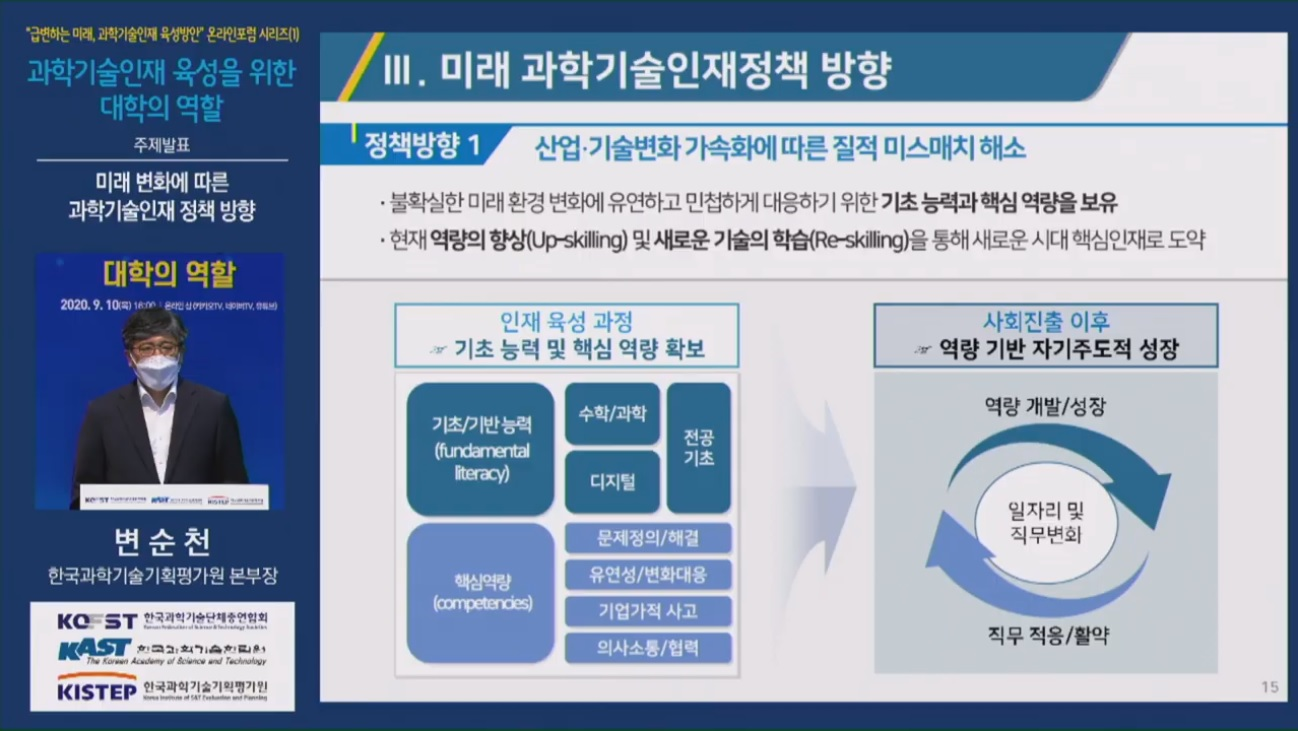
The Special Act on the Support of Human Resources in Science and Engineering, which was first enacted in 2004 to support science and engineering fields that had been shunned since the IMF, will begin its 4th plan next year as the 3rd plan ends this year. The 3rd plan, which focused on strengthening supports for jobs and utilizing training, is said to have contributed to the quantitative expansion of new workers and female scientists and engineers.
Director General Byun said: "Unlike the previous plan, the 4th plan is in a special situation due to drastic changes caused by the COVID-19, so we will establish a plan to reflect future changes and maintain consistency with existing policies." He also stressed, "Currently, digital transformation for untact social solutions is progressing rapidly, and we need to build a smart platform based on it, not on digital transformation itself."
Through this presentation, Director General Byun set 2 directions for "resolving qualitative mismatches due to accelerating industrial and technological changes" and "resolving quantitative mismatches due to changes in population structure," and presented 5 strategic areas: "secure basic capabilities," "establishing a continuous capacity development system," "expanding the base for future talent inflow," "activating potential participation" and "advancing institutional infrastructure.“
Government should foster the human resources who have basic skills and core competencies so that they can seek to be a self-directed person even after entering society. It will also prepare for a gradual decline in manpower by raising interest in S&T from the elementary and secondary school period and strengthening supports for growing science and engineering students after college.
The 2nd topic of presentation was “In post COVID-19 era, innovation of universities in science and engineering fields”. Professor Ahn suggested 3 main issues which universities in science and engineering fields have to concern based on the universities’ fundamental 3 functions: Education, Research, Business Development.
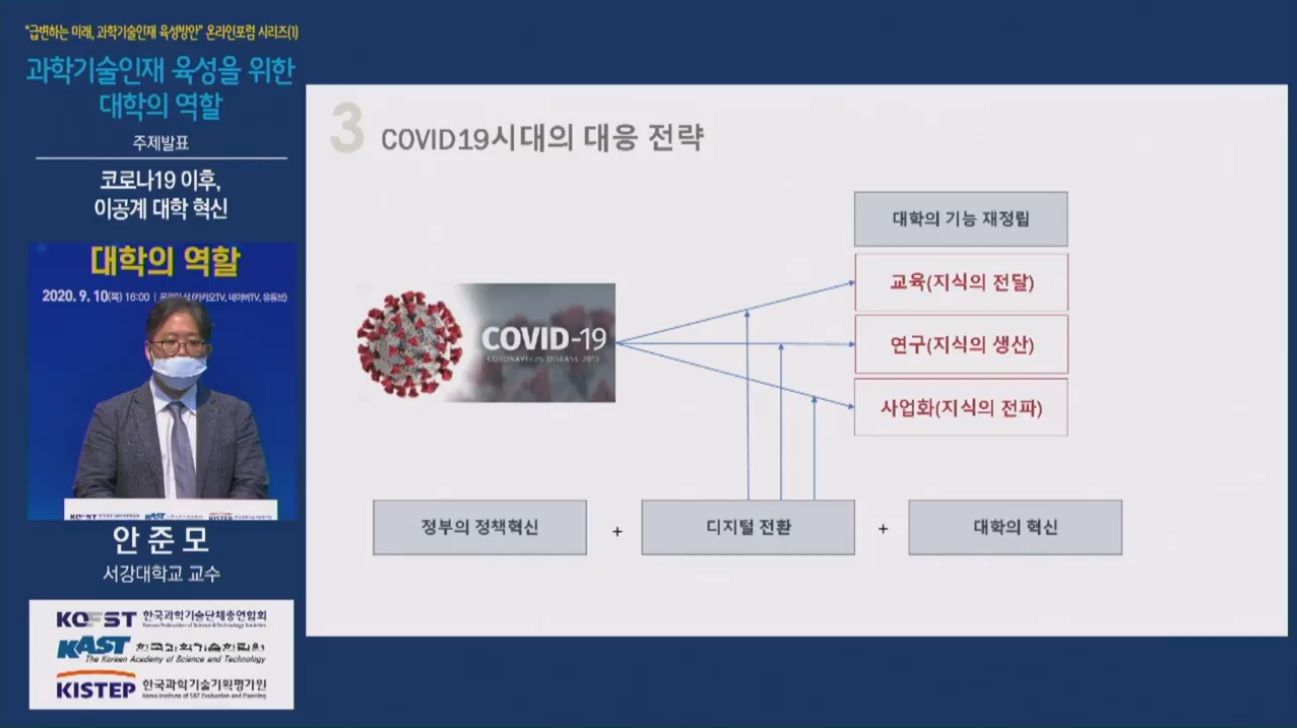
As untact lectures are ongoing, the gap of students’ academic ability based on digital resources is getting more intensified. Diverse variations, for example if a student has a laptop or not, the stability of WiFi connection, influence the educational environment. There’s a difficulty to substitute many practices and experiments in untact.
Problems also appear in the aspect of research. Conferences or colloquiums are not only the place where people can share information but the opportunity to establish new networks to rising researchers. However, because all conferences or colloquiums is being substituted in untact or online, they lose these opportunities. Moreover, this situation is a huge obstacle to the fields which need physical cooperation such as the experiments proceeded by overseas universities or companies.
Professor Ahn stressed 3 points to resolve these problems: ‘Transition to digital’, ‘Universities’ Innovation themselves’, ‘the financial, political support through government’s policy innovation’. He also insisted that various untact educational systems have to be developed for provision of experience to students by aggressive investment to the edu-tech, because lots of knowledge in S&T fields is hard to simply explain in words and writings so that it’s urgent. He stressed that universities’ leading laboratory has to be a local research hub as a substitute for a global research hub in the aspect of research, and the protocol for remote experimentation, etc has to be organized.
For vitalizations for university’s business development, it needs to increase the related staffs to strengthen the role of industrial-academic cooperation foundation so that universities can build their own networks. Meanwhile, he suggested that the government has to provide drastic supports to the universities which wants to innovate themselves, and to adjust the opinions within the government departments.
In the following panel discussion, Professor Sung-ju Lee commented the universities provide not only academic knowledge but an opportunity to build a network with other students, so they have to contemplate what experience has to be provided. He also stressed the attitude of open-minded innovation, and it can be connect to the competitiveness built by an industrial-academic-local cooperation.
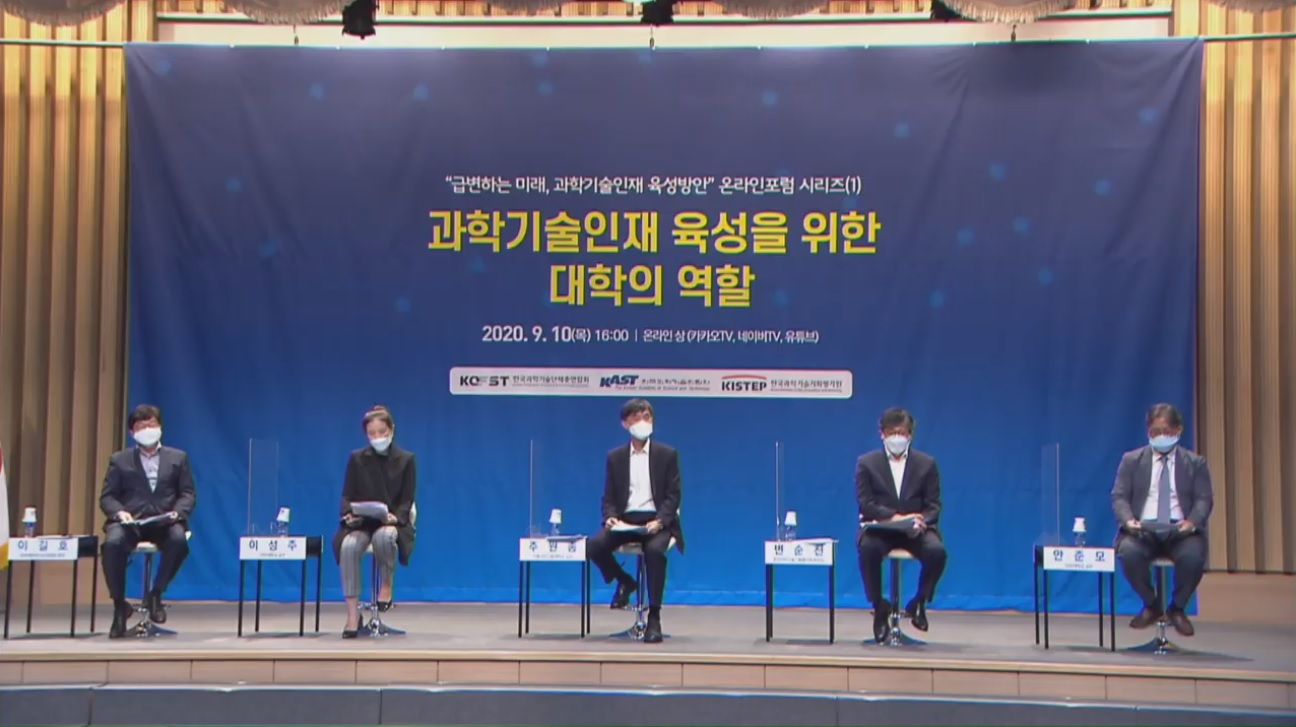
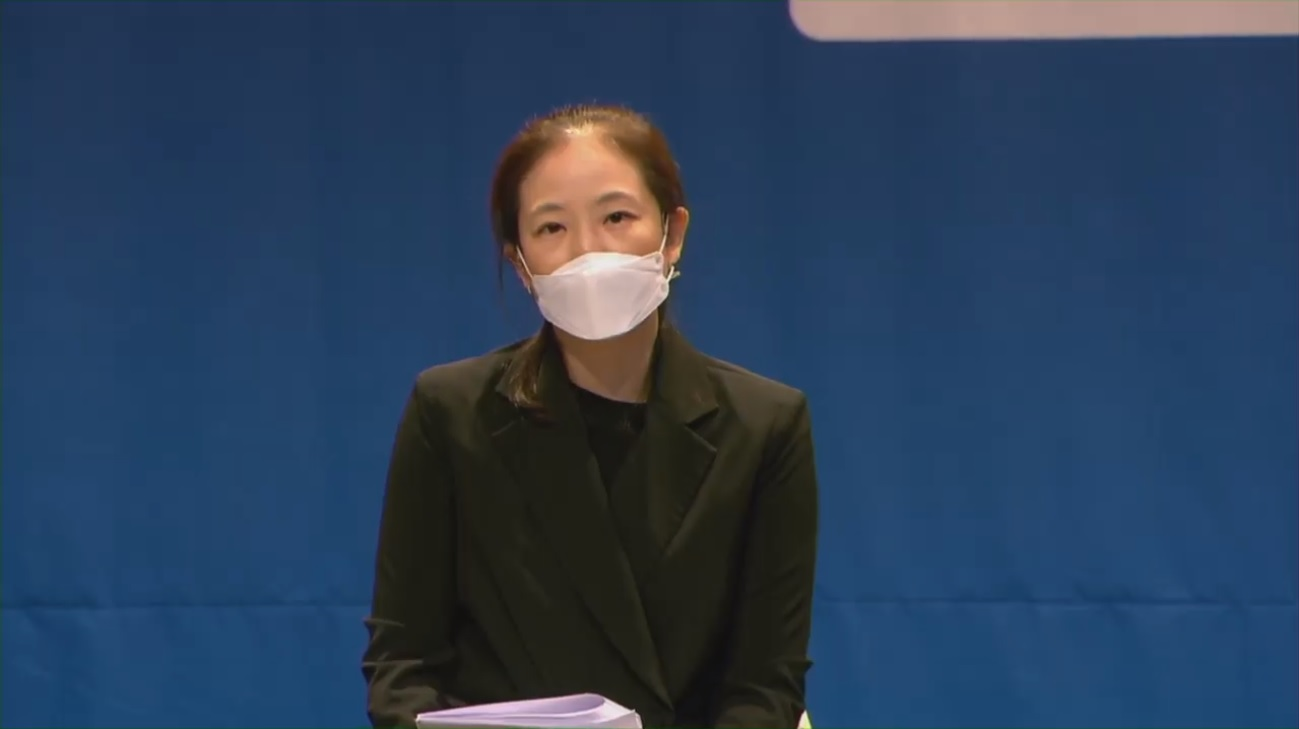
President Gil-ho Lee said that the problems raised during the untact class can be solved in the future in terms of technology, and he pointed out that the problem was caused by the lack of proper teaching methods due to the rapid transition, not the essential nature of the untact classes. He also said that the most important thing is to combine the technologies that will be developed in the future with educational contents and processes. He mentioned in order to establish the devices and mechanisms necessary for untact classes, not only individual efforts are needed, but we need active help from the ministries and an organized entity for edu-tech.
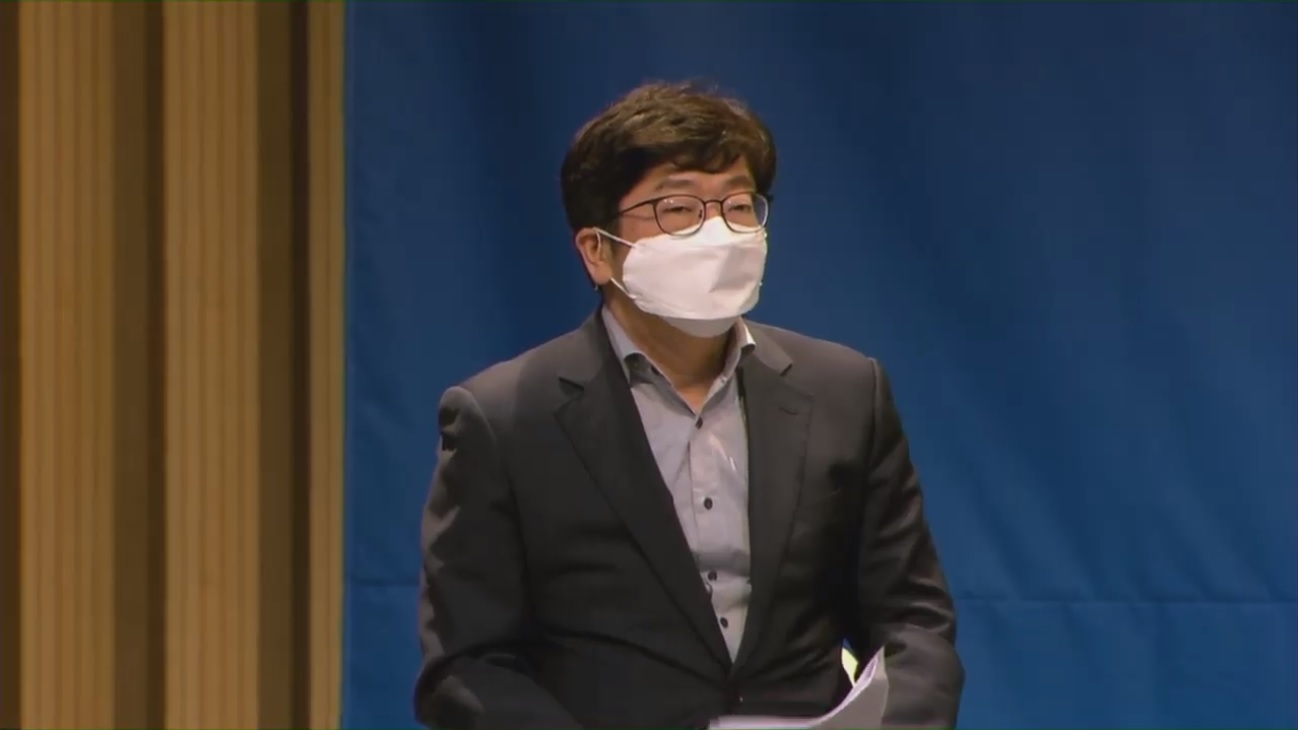
This forum was aimed to share the fundamental concern about the plan and to find henceforth direction of change. Its progress followed a COVID-19 guideline, and the forum was streamed online on Youtube, Kakao TV and Naver TV. The replay video will be uploaded on KOFST’s Youtube channel.
(Replay) https://youtu.be/vf0Vz8J1BMc
Director General Soon-cheon Byun(KISTEP), Professor Jun-mo Ahn(Sogang University), Professor Sung-ju Lee(Ajou University), and President Gil-ho Lee(Korea Edutech Industry Association) participated in the forum and Won-jong Joo(Seoul National University of S&T) hosted the forum.
The 1st topic of presentation was “the policy direction of human resources in S&T with changing future” by Director General Soon-cheon Byun, and he suggested the current status of policy for human resources in S&T and the henceforth direction of the policy.

The Special Act on the Support of Human Resources in Science and Engineering, which was first enacted in 2004 to support science and engineering fields that had been shunned since the IMF, will begin its 4th plan next year as the 3rd plan ends this year. The 3rd plan, which focused on strengthening supports for jobs and utilizing training, is said to have contributed to the quantitative expansion of new workers and female scientists and engineers.
Director General Byun said: "Unlike the previous plan, the 4th plan is in a special situation due to drastic changes caused by the COVID-19, so we will establish a plan to reflect future changes and maintain consistency with existing policies." He also stressed, "Currently, digital transformation for untact social solutions is progressing rapidly, and we need to build a smart platform based on it, not on digital transformation itself."
Through this presentation, Director General Byun set 2 directions for "resolving qualitative mismatches due to accelerating industrial and technological changes" and "resolving quantitative mismatches due to changes in population structure," and presented 5 strategic areas: "secure basic capabilities," "establishing a continuous capacity development system," "expanding the base for future talent inflow," "activating potential participation" and "advancing institutional infrastructure.“
Government should foster the human resources who have basic skills and core competencies so that they can seek to be a self-directed person even after entering society. It will also prepare for a gradual decline in manpower by raising interest in S&T from the elementary and secondary school period and strengthening supports for growing science and engineering students after college.
The 2nd topic of presentation was “In post COVID-19 era, innovation of universities in science and engineering fields”. Professor Ahn suggested 3 main issues which universities in science and engineering fields have to concern based on the universities’ fundamental 3 functions: Education, Research, Business Development.

As untact lectures are ongoing, the gap of students’ academic ability based on digital resources is getting more intensified. Diverse variations, for example if a student has a laptop or not, the stability of WiFi connection, influence the educational environment. There’s a difficulty to substitute many practices and experiments in untact.
Problems also appear in the aspect of research. Conferences or colloquiums are not only the place where people can share information but the opportunity to establish new networks to rising researchers. However, because all conferences or colloquiums is being substituted in untact or online, they lose these opportunities. Moreover, this situation is a huge obstacle to the fields which need physical cooperation such as the experiments proceeded by overseas universities or companies.
Professor Ahn stressed 3 points to resolve these problems: ‘Transition to digital’, ‘Universities’ Innovation themselves’, ‘the financial, political support through government’s policy innovation’. He also insisted that various untact educational systems have to be developed for provision of experience to students by aggressive investment to the edu-tech, because lots of knowledge in S&T fields is hard to simply explain in words and writings so that it’s urgent. He stressed that universities’ leading laboratory has to be a local research hub as a substitute for a global research hub in the aspect of research, and the protocol for remote experimentation, etc has to be organized.
For vitalizations for university’s business development, it needs to increase the related staffs to strengthen the role of industrial-academic cooperation foundation so that universities can build their own networks. Meanwhile, he suggested that the government has to provide drastic supports to the universities which wants to innovate themselves, and to adjust the opinions within the government departments.
In the following panel discussion, Professor Sung-ju Lee commented the universities provide not only academic knowledge but an opportunity to build a network with other students, so they have to contemplate what experience has to be provided. He also stressed the attitude of open-minded innovation, and it can be connect to the competitiveness built by an industrial-academic-local cooperation.


President Gil-ho Lee said that the problems raised during the untact class can be solved in the future in terms of technology, and he pointed out that the problem was caused by the lack of proper teaching methods due to the rapid transition, not the essential nature of the untact classes. He also said that the most important thing is to combine the technologies that will be developed in the future with educational contents and processes. He mentioned in order to establish the devices and mechanisms necessary for untact classes, not only individual efforts are needed, but we need active help from the ministries and an organized entity for edu-tech.
